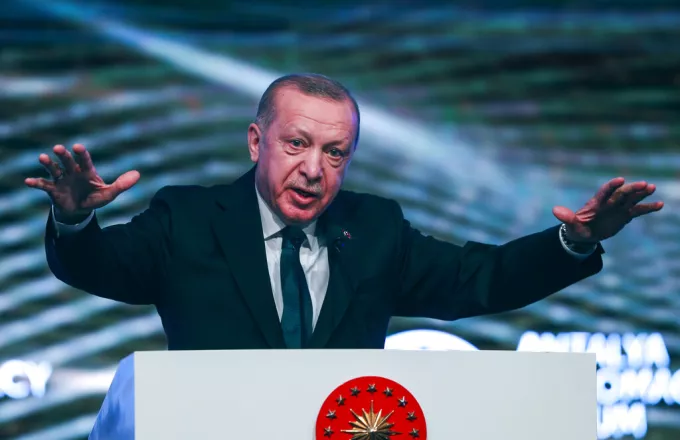Turkey continues to hint at blocking NATO expansion and walks a middle ground on the war in Ukraine. SAIS Turkey expert Lisel Hintz discusses what the enigmatic nation might be up to.
Turkish President Recep Tayyip Erdoğan, a onetime reformer now solidly in the strongman camp, has now ruled for 20 years, during which time his nation has rarely been out of the news. Sometimes this is for curious reasons, such as recent calls to rename the country Türkiye (tur-key-yay), and sometimes the headlines are more problematic: Turkey’s Putin-pleasing opposition to Sweden and Finland joining NATO, for example. Despite the accord Turkey signed with the Nordic countries at June’s NATO summit in Madrid, Erdoğan continues to signal he may disrupt the process if not fully satisfied with concessions made. Then there’s Turkey’s 2019 invasion of northern Syria in pursuit of Kurdish militants—many of whom were U.S. allies in the war against ISIS. More recently, while a Turkish firm sold attack drones to Ukraine, Turkey has not sanctioned Russia. Flights between Ankara and Moscow continue.
“Erdoğan is a master of refusing to let a crisis go to waste,” says Turkey expert Lisel Hintz, an assistant professor of international relations and European studies at the Johns Hopkins School of Advanced International Studies. “Whether it’s using the millions of Syrians seeking asylum in Turkey to try to extract political concessions from the European Union or using Russia’s invasion of Ukraine as an opportunity to position Turkey as an important mediator (and avoid having to compromise relations on either side), he’s extremely deft at creating opportunities.”
“ERDOĞAN IS A MASTER OF REFUSING TO LET A CRISIS GO TO WASTE.”
Perhaps Erdoğan’s greatest example of crisis opportunism was in the wake of a failed attempt to topple him in a 2016 coup. He arrested tens of thousands of political opponents, real or imagined, and purged the civil service and the judiciary—refilling positions and judgeships with loyalists. Some 90% of Turkish media is connected to the government, and it’s a crime to publicly insult Erdoğan. Sharing an unflattering caricature of him on social media is a jailable offense.
His grip on the country now includes de facto control of the central bank, which has made the economically unorthodox move of lowering interest rates in the face of soaring inflation. The Turkish lire has plunged in value, and inflation is near 70%.
With Turkish elections in the offing, the Hub turned to Hintz for insights on what’s next for the nation.
The move to block Sweden’s and Finland’s requests to join NATO has been criticized internationally. What’s the motivation here?
The motivation is related to this larger push to have the international community reckon with Turkey’s concerns. Turkey’s leaders exploited the political opportunity presented by the fact that NATO requires consensus for new members to join to raise their voice and insert their demands—here, for Sweden and Finland to take a firmer stance on Kurds and others Turkey views as “terrorists”—into the NATO agenda. This represents the kind of spilling over of domestic identity politics I analyze in my book Identity Politics Inside Out. The AKP currently struggles with losing support from those frustrated with its mismanagement of the economy, and with the imposition in daily life of what I call the “Ottoman Islamist” understanding of Turkish identity that Erdoğan has tried to disseminate among citizens. Taking his party’s fight outside to the foreign policy arena by demanding that international actors cease their support of Kurdish movements can counter this loss, rallying support from nationalists of various stripes back home.
A large portion of Turkey’s population sees the Kurdish movement writ large—not just the Kurdistan Workers’ Party (PKK)—as a terrorist threat. That is largely because of decades of government efforts to paint any oppositional Kurds as supporters of terrorism who are threatening to the unity of the Turkish nation. What the government is trying to do is say, ‘Hey Sweden and Finland, we see that you have accepted all of these Kurds who fled Turkey. But what you call political asylum-seekers, we consider terrorists.’ They’re also looking to leverage NATO negotiations toward other aims. They called for Kurds to be deported, which is unlikely to happen, but were able to persuade Sweden and Finland to agree to lift the arms embargoes they had placed on Turkey after its military incursions against Kurds in northern Syria. They were also able to nudge President Biden toward providing Turkey with much-needed F-16s, but this is complicated by pushback from Congress. Even further, denouncing oppositional Kurds as terrorists in the foreign policy arena creates an opportunity to try to divide the opposition back home ahead of elections. A number of opposition groups are coming together in ways that threaten the AKP’s continued rule, and Kurds have been key to the opposition’s ability to challenge the AKP in the past. So, this fans nationalist flames and positions oppositional Kurds as a threat, making it difficult for parties to partner with Kurds. And now, most troubling of all, it seems they are laying the groundwork for another new incursion in Syria, ostensibly to once again target Syrian Kurdish militants that observers outside of Turkey don’t see as a threat.
This stance, coupled with how far the country has backslid from democracy, has some calling for it to be booted out of the alliance. Is that even possible?
There is no institutional mechanism for kicking Turkey out of NATO. Also, with its geopolitical positioning, Turkey is an important partner for NATO. The U.S. military benefits from using Incirlik Air Base in Adana, and Turkey hosts nuclear weapons. I would say there’s a less than 1% chance that Turkey would leave NATO on its own. Turkey is in an ideal position where it benefits from the collective defense provisions of NATO but finds a way to carve out its own space within it, like with its odd partnership with Russia.
They say people vote their pocketbooks, and all diversions aside, could an increasingly cash-strapped citizenry end Erdoğan’s rule?
The way that polling numbers look now, he will not win. But any scenario in which Erdoğan loses would require free and fair elections. There is a very serious possibility that this will not be a free and fair contest and that the AKP will use all the tools in the authoritarian toolkit to rig the election. I worry that any upcoming intervention in northern Syria, and any unrest that intervention generates, could be the pretext to declare a state of emergency. They could then cancel elections in the Kurdish region or hold elections under particular conditions that are conducive to an AKP win. The last presidential election in 2018 was under a state of emergency, so it would not be unprecedented.
What do we know about its proposed name change to Türkiye?
In some ways it is a publicity campaign trying to rebrand Turkey. The term “Turkey” can have a silly or derogatory meaning in English. Much more so, though, it is an effort by the Turkish government to assert its dominance in the international sphere. It’s part of larger efforts to get international actors to take Turkey and its concerns more seriously—you will now call us what we tell you to call us. It’s caused a bit of an eyeroll in some circles and poses a lot of logistical complications. Not even its English-language media is using the term consistently.

The authoritarian playbook
Published Oct 30, 2020




